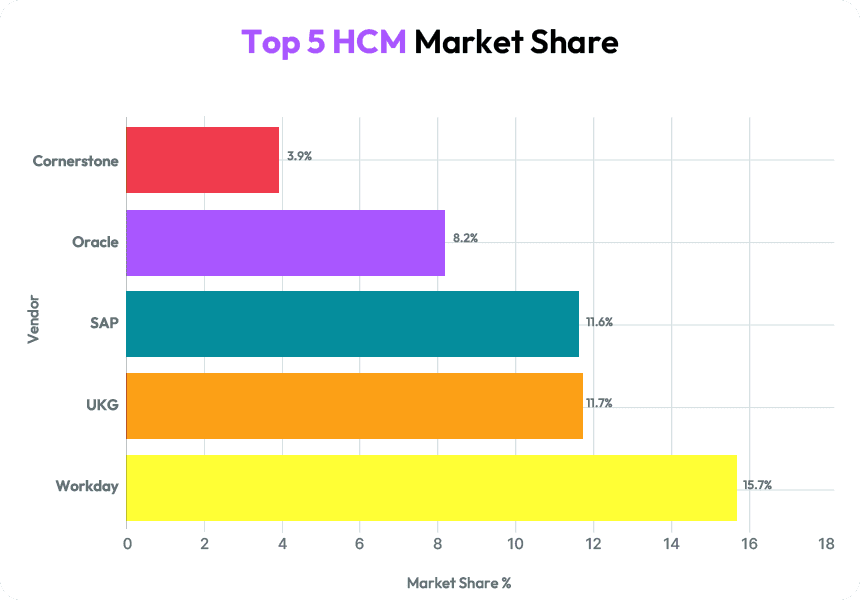With Mars landings all the rage, it might be apt to say that HCM is being terraformed before our very eyes.
With extensive shifts in the systems that underly HR ecosystems, organizations are racing to modernize legacy infrastructure and are doing so while trying to keep up with emerging artificial intelligence capabilities. It would be an understatement to say that the task at hand for CIOs and CHROs is proving difficult to carry out.
With events like HR Tech 2025 taking place this week, it’s an ideal time to reflect on the opportunities and challenges defining this critical evolution in enterprise level HCM solutions.
Learn how Opkey can help you save time, cost, and effort. Get Demo
What is the state of HCM today?
Global HCM Market
The HCM market has reached a remarkable scale, with +$35 billion in annual recurring revenue, growing at 13% annually. North America continues to dominate with 61% of global revenue, while EMEA accounts for 24% of the market. This growth reflects not just general market expansion, but fundamental shifts in how organizations approach workforce management and employee experience.
The competitive landscape reveals concentrated market power among established players. At the same time, there is a stark differentiation emerging between traditional enterprise solutions, and innovators pushing the bounds of what’s possible.
Top 5 HCM Market Share Leaders

Who is leading, and why?
Workday is maintaining its global leadership position at 15.7% market share, followed closely by UKG (11.7%) and SAP (11.6%). Oracle holds 8.2% of the market, while Cornerstone OnDemand, despite impressive growth, remains at approximately one-quarter of Workday’s scale. This concentration among the top five vendors demonstrates the market’s preference for proven, comprehensive platforms capable of handling complex requirements.
Challenges Faced
Cloud Migration
Despite talk of widespread cloud adoption, the reality is more nuanced. Cloud solutions account for 76% of total HCM revenue, yet many organizations continue struggling with legacy system transitions. It is all but certain that companies will continue to turn to testing and implementation partners to guide workflows and bridge the gap, as enterprises face mounting pressure to seamlessly modernize their operations.
The barriers to cloud migration extend beyond technical considerations. Organizations are most concerned with:
- Data quality and migration risks
- Complex global compliance requirements
- Integration challenges
Such concerns with cloud migration are not unfounded, but it’s also universally clear that sticking with the status quo is unwise. The conundrum is that the very issues that propel enterprises to modernize are the same ones that make modernization difficult. For example, legacy systems often contain years of accumulated technical debt, outdated code dependencies, and undocumented customizations. These issues hamper and complicate modernization.
Uncertain ROI for AI
While GenAI and Agentic AI dominate vendor messaging, real-world impact remains limited.
According to The GenAI Divide: State of AI in Business 2025 report by MIT, 95% of generative AI pilots fail to deliver meaningful ROI.
What is less widely understood, though, is why. It turns out that the primary barriers to AI success aren’t technological, but organizational. These can include:
- Brittle workflows that are prone to break without proper testing
- Lack of contextual learning; reliance on static, manually written content
- Misalignment with day-to-day operations
Companies investing billions in AI tools often discover that individual productivity gains don’t always translate to measurable business impact. Agentic AI may show more promise, but organizational and culture shifts are still necessary to unlock its full potential.
How Companies are Rising Above Challenges
For HR technology, cultural shifts are massively important in addressing challenges with implementation. Second, the need for quality testing increases exponentially when organizations transition between two fundamentally different system architectures.
What does bad testing look like?
Poor testing protocols often involve:
- Inaccurate record and definition of requirements
- Inadequate validation processes
- Low user adoption,due to gaps in change management
What does great cloud HCM implementation and testing look like?
CIOs and CHROs leading the implementation of cloud-based HCM modules encounter a wide range of challenges. Effective configuration, rigorous testing, and stakeholder alignment must be strategically planned, validated, and executed to keep costs under control, minimize risks, and deliver ROI expectations. Realizing these outcomes calls for a comprehensive platform like Opkey- purpose-built to orchestrate and support the entire implementation lifecycle.
Beyond just test automation, Opkey helps enterprises unlock millions in IT savings with the industry’s first and only agentic AI-native platform. Purpose-built to accelerate business value, Opkey radically transforms how IT and business leaders implement and operate HCM enterprise apps like Oracle and Workday.
Opkey will:
- Centralize and automate configuration: Identify, map, and manage every phase of configuration from comparison to migration with an end-to-end solution and step by step automation logic.
- Accelerate and scale with test automation: Pre-built accelerators, industry specific templates and intelligent test automation help complex projects get completed in a fraction of the time.
- Reduce implementation costs: Opkey protects against budget overruns and expensive project management delays with advanced monitoring and observability, analytics, config ops and workflow management.
- Bolster end user adoption with integrated change management: Leverages end to end test case data and AI to automate user guide creation and updates, guide users through new processes and offers personalized in-app prompts for contextual learning.
Looking Forward in HCM
The HCM market’s evolution requires leadership at the intersection of enterprise software testing, cloud migration support, and AI validation. Companies are struggling with legacy modernization and AI-enhanced applications, and they need specialized testing expertise to help wade through the waters of transformation in HCM.
The transition of moving from legacy to HCM cloud is still and active and relevant challenge facing global enterprises, and there’s never been a more important need to not only manage the transition with lowered cost and risk, but also future proof enterprise app ecosystems to adopt emerging AI technologies with ease and zero disruption to business workflows.
Buying decisions are heavily influenced by tangible proof and confidence that cloud or Agentic AI investments will have a direct impact on employee growth, talent agility, skill management and employee experience.





